
Samyang MF 85mm F1,4 AS IF UMC Canon M
- Suitable for full format and APS-C sensor
- Looks like 128 mm on the APS-C (DX) camera, even like 170 mm on cameras with 4/3 (MFT) sensor
- Excellent speed of f/1.4, aperture and focus operated manually
- Very good imaging quality thanks to high quality aspherical glass lenses
- Internal focusing
- High quality manufactured mechanics and optics
- Incl. bag, protective cover and lens hood
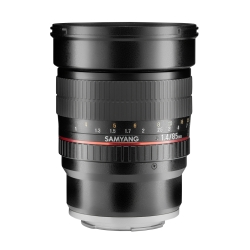
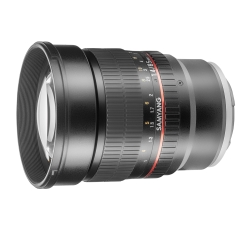
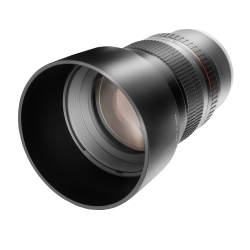
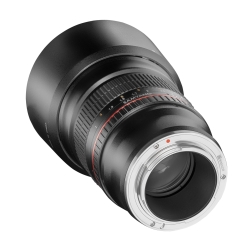
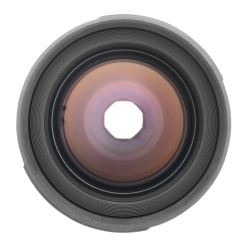
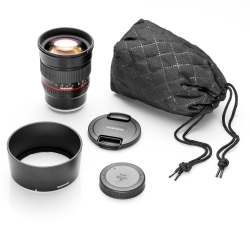
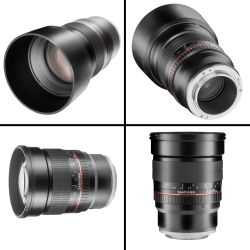










Optimal image angle - beautiful portraits
The 85 mm lens from Samyang offers concentration on the essentials. On the full frame camera, the 29° angle of view provides the typical detail for portraits. If the 85 mm f/1.4 is locked to an APS-C camera, an image angle of 19° is achieved, which roughly corresponds to the image impression of a 135 mm lens. The same 85 mm lens on a 4/3 (MFT) camera has the same image impact as a 170 mm lens on a full format camera - also with a 1.4 aperture. This very practical speed of f/1.4 does not only provide an extremely bright viewfinder, but also the possibility of taking pictures with the smallest depth of field. The lens is very well corrected and convinces by very good and distortion-free imaging performance. The very compact design provides a pleasant handling with balanced center of gravity.
Excellent light intensity
Due to the high speed, this Samyang lens allows the use of short exposure times or lower ISO values. This significantly reduces image noise. The large aperture with a shallower depth of field optimizes the position of the focal plane in the viewfinder. A practical secondary benefit of the high speed is the highlighting of the subject against a blurred foreground or background.
High quality optics and mechanics
The lens has internal focusing and has a close-up limit of 100 cm. With 9 lenses in 7 groups, it is very elaborately built, with optimum performance expected even with the aperture open. When focusing, the lens elements are shifted on the inside: the overall length of the optics therefore does not change when focusing, and the 72mm filter thread does not rotate. The iris diaphragm has 8 blades and thus an almost circular aperture pattern. The blur is reproduced harmoniously, the bokeh is balanced and calm, the highlights nearly circular. Of course, all lens surfaces are multicoated to increase the contrast of the images and to avoid reflections. Everything is rounded off by precise mechanics, clearly latching aperture values and production in a high-quality metal frame.
Advantages of a full frame lens on a camera with APS-C sensor
Save time in post-processing. A variety of lens defects such as distortion, edge blur, or vignetting appear on the edge of the image. If you use a full-frame lens on a camera with an APS-C sensor, these areas will not be used. Thus, maximum quality is obtained. Additional post-processing time for the correction of lens errors is therefore not necessary.
| Product Color | Black |
| Length | 100,7mm |
| Weight | 570g |
| Field of Application | Portrait, People Photography, Cutting out, Wedding Photography, Low Light Photography |
| Manufacturer | Sony |
| Bayonet | E |
| Lens connection | Sony E |
| Developed for | Full Frame |
| Suitable for Sensor | APS-C, Full Frame |
| Focal Distance | 85mm |
| Lens Speed | 1:1,4 |
| Internal Focusing | Yes |
| Lenses / Groups | 9 / 7 |
| Number of Aperture Slats | 8 |
| Coating | UMC - Ultra Multi Coating |
| Minimum Focusing Distance | 1,1m |
| Lens Diameter | 78mm |
| Filter Diameter | 72mm |
| Category | Telephoto Lens |
| Field of Application Lens | Journey, Portrait |
| Camera Model | Canon EOS M, Canon EOS M 10, Canon EOS M 2, Canon EOS M 3 |
| Usage | Photo |
| Girth | 740mm |
| Height of Packaging | 160mm |
| Length of Packaging | 130mm |
| Weight incl. Packaging | 768g |
| Width of Packaging | 130mm |
- 1x Samyang MF 85mm F1.4 Canon M lens
- 1x Lens hood
- 2x Lens cap (front and rear)
- 1x Lens protection bag
- 1x Manual